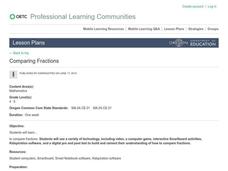University of California
Hot! Hot! Hot!
Calories are not tiny creatures that sew your clothes tighter every night, but what are they? A science activity, presented at multiple levels, has learners experiment with heat, heat transfer, and graph the function over time. It also...
Teach Engineering
Designing Bridges
Introduces your class to the types of loads experienced by a bridge. Groups calculate the ultimate load combinations to determine the maximum load requirement. Using this information, builders then determine the amount of material they...
Teach Engineering
Circuits and Magnetic Fields
Have your class use compasses to try to find the magnetic field around an electric current. Groups use the same technique to visualize magnetic fields as they did in the second activity in the series, but this time, the field is created...
Teach Engineering
Clay Boats
Clay itself sinks, but clay boats float. Why? Young engineers build clay boats to learn about buoyancy. They test the weight the boats can hold using washers and then tweak their designs to make improvements, following the engineering...
Curated OER
Invertebrate Diversity
Comparative anatomy prevails in the lesson exploring diversity among invertebrates. Biologists examine physical characteristics of an earthworm from phylum annelida and a meal worm from phylum insecta. They also inspect a cricket and a...
Curated OER
Earth's Heavenly Treasures: Hummingbirds
Young ornithologists watch an informative video and use the Internet to gather data about the life, size, habitat, and migration of hummingbirds. The interdisciplinary lesson includes activities that target art, science, math, and...
Dig-It Games
Mayan Mysteries
Who is Ladrone? Join Fiona and Charlie as they accompany their Uncle Alex to Guatemala to help Chief Mateo determine the identity of the elusive Ladrone and solve Mayan mysteries. Players of this interactive game learn much about Mayan...
Science 4 Inquiry
Monster Mash-Up of Genetics
It's alive! Young mad scientists create monsters as they explore the probabilities of genetic traits during a well-structured inquiry lesson. Pairs travel from station to station, rolling the dice and adding traits to their creations as...
National Science Teachers Association
Hop into Action
Young scientists find out what makes amphibians such unique and interesting animals in this simple life science activity. After looking at pictures and discussing the characteristics of amphibians, learners complete a series of three...
Illustrative Mathematics
How Thick Is a Soda Can I?
The humble soda can gets the geometric treatment in an activity that links math and science calculations. After a few basic assumptions are made and discussed, surface area calculations combine with density information to develop an...
Teach Engineering
Show Me the Genes
Give your class a chance to show what they know. In the last installment of a seven-part series, pupils summarize and review what they have learned in the series. They present their solutions for creating a biosensor to detect cancer...
Teach Engineering
Keepers of the Gate Journal and Brainstorm
The second segment of a seven-part series reviews the challenge of determining whether gargling with salt water helps a sore throat. Individuals journal what they know about the challenge and what they are trying to figure out to...
Teach Engineering
Basically Acidic Ink
If you don't want to drink red cabbage juice, here's another use for it—a decoder! Using vinegar and ammonia-based window cleaning liquids as invisible inks, scholars create designs in the second lesson of the series. Red cabbage juice...
Teach Engineering
Design Inspired by Nature
Let nature guide your engineering designs. By taking apart a flower, pupils learn about reverse engineering. They use the results to brainstorm designs for new products or ideas. This is the seventh installment of a nine-part Life...
Curated OER
Comparing Fractions
The best way to teach students how to compare fractions is using visual means. This instructional activity suggests a variety of ways to help learners understand this concept using a SMART Board, Kidspiration, videos, computer games, and...
Curated OER
Testing Leaves for Starch: the Technique
Like good scientists, kids often want to see first-hand why things are as they are; they can do just that in the starch-testing photosynthesis activity found here. Depending on the age of your pupils, you may wish to do the investigation...

















